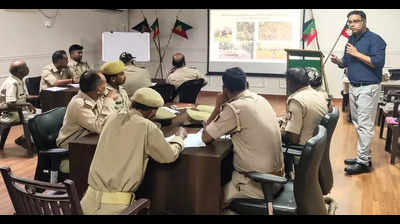- News
- City News
- bareilly News
- WTI trains forest personnel to address rising human-wildlife conflicts
Trending
WTI trains forest personnel to address rising human-wildlife conflicts

This initiative followed a series of wolf attacks in Bahraich district, resulting in 10 deaths and 36 injuries since March.

The training program was supported by the US Fish & Wildlife Service (USFWS) and Chester Zoo.
Manager and head of the human-wildlife conflict mitigation division at WTI, Dr. Abhishek Ghoshal said that the comprehensive capacity-building program trained 42 frontline forest personnel, including range and deputy range officers and forest inspectors from seven KWLS ranges: Katerniaghat, Nishangara, Sujauli, Murtiha, Kakraha, Dharmapur, and Motipur, on various aspects of human-wildlife conflict and its mitigation strategies.
The training covered topics such as the definition of conflict, levels and types of conflict, causes and drivers, mitigation measures—preventive, reactive, and preemptive—stakeholder analysis, community engagement, crowd management, technology for monitoring animals involved in conflict, and principles of wildlife rescue and rehabilitation, Dr. Ghoshal added.
Addressing the seriousness of human-leopard conflict
, Dr. NVK Ashraf prioritized the need for more scientific and ethical wildlife rescue methods, advocating for offering safe passage to animals rather than capturing them unless they pose a significant threat. "Capturing a feline negatively impacts its natural behaviour and leads it to avoid humans," he said.
Dr. Ghoshal recommended simple behavioral changes to reduce conflict. "Avoiding open defecation, conducting agricultural activities in groups, keeping children away from forest areas, and not sleeping outdoors with infants can help alleviate human-wildlife conflicts. Coordination with village-level eco-development committees, village panchayats, and local administration can encourage these changes," he said.
The WTI training panel included Dr. NVK Ashraf, chief veterinarian; Rudra Mahapatra, head of the training division; Milind Pariwakam, project head of landscape management and conservation (central India); and Dr. Abhishek Ghoshal.
End of Article
FOLLOW US ON SOCIAL MEDIA










